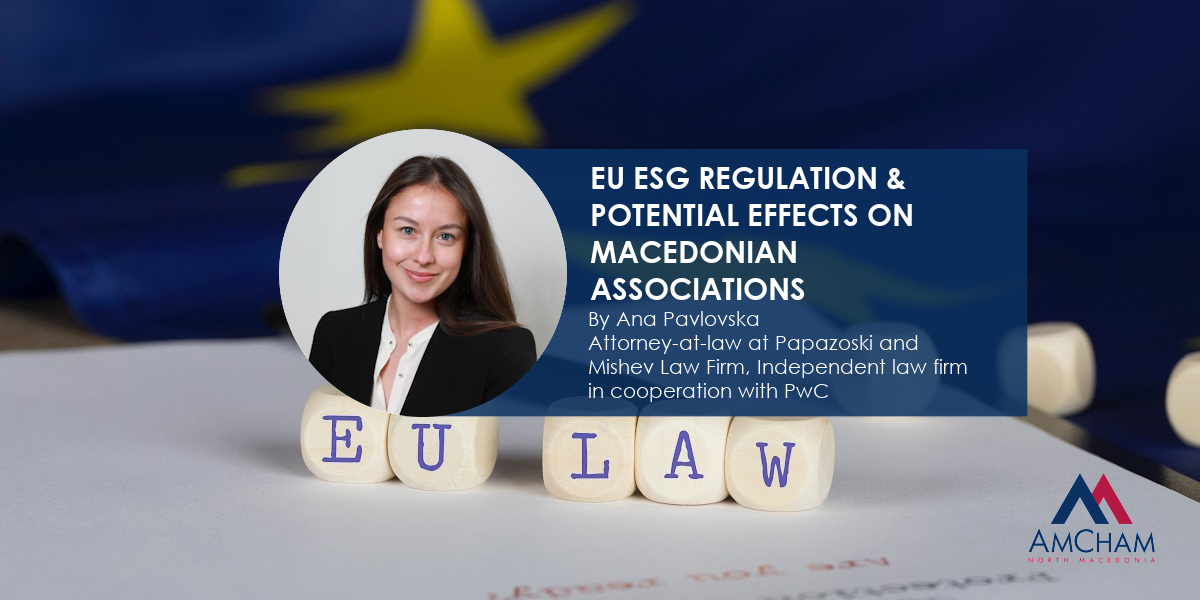*The article in Macedonian language, published by Kapital can be found at the bottom of this page.
The year 2021 is considered an extremely productive year for the European Union (EU) in terms of developing and improving the ESG regulation, and the same potential is reflected in 2022.
The EU companies are obliged to comply with the enhanced obligations imposed by the ESG regulation. The efforts that have to be invested in order companies to be classified and adjusted to the definition of “sustainable businesses” and to be recognized as such by investors in EU’s market, pose by itself, a major challenge.
Rather than organizations simply meeting legal obligations, the EU is actively engaged in the development of legislative instruments and mechanisms to ensure an efficient implementation of the ESG regulation.
Prior to North Macedonia’s formal EU accession, it is important to highlight the impact that amendments suggestions to the EU’s ESG Regulation may have on Macedonian associations. The article will provide a brief summary of the most significant amendment suggestions to the EU’s ESG Regulation that are anticipated to have an effect over the Macedonian associations.
- Proposal for Carbon Border Adjustment Mechanism
The EU has a clearly strong approach in combating climate change, and as a result, it sets ambitious climate policies that include industrial decarbonization.
Industrial decarbonization essentially entails a reduction in CO2 emissions through a variety of methods. One of these methods is the imposition of additional taxes on companies that emit CO2 and are considered environmental polluters.

Attorney at Law
Papazoski and Mishev Law Firm,
Independent law firm in cooperation with PwC
By pursuing industrial decarbonization, production, expenditure, and investment decisions on the EU territory are directly impacted.
In light of this, it can be easily concluded that companies registered in the EU and are classified in the carbon-intensive industry would be incentivized to relocate their operations to counties where this would not impose a financial burden on their operations.
This is the reason why the European Commission has submitted a proposal for the adoption of a regulation for implementing the Carbon Border Adjustment Mechanism – CBAM, which would protect against carbon leakage, i.e., it must prevent or reduce the movement of carbon-intensive financial activities from the EU into third countries such as North Macedonia.
Regarding its implementation, this regulation is anticipated to be adopted by the end of this year, to enter into force in 2023 with a three-year transitional period, and to be fully applicable on January 1, 2026.
This regulation will primarily be applied to companies in five sectors: energy, steel and iron, fertilizers, aluminum, and cement (CBAM products), but its application could be expanded to various other industries. CBAM is a measure that guarantees that for CBAM products imported into the EU, a fee will be paid for the embedded carbon emissions similar to the fee paid by EU producers in accordance with the EU’s Emissions Trading System’s requests (EU ETS).
The payment is planned to be conducted by purchasing CBAM certificates. The certificate fee will be calculated depending on the average weekly auction fee of the emission permits that are traded by EU ETS. If importers on the EU market can prove that a fee was paid for carbon emissions in the country of origin (such as North Macedonia), the number of required CBAM certificates can be reduced by taking into account the amounts paid for carbon emissions in the non-EU country, as each country has its own carbon emission fees.
After the adoption of the regulation, the EU will initiate discussions with third countries whose trade may be impacted by these measures. Given the inevitability of the carbon emission fee, North Macedonia should carefully consider implementing a system that would retain this capital within the country, with the goal of using it for decarbonization of the country and assisting associations in their climate and environmental transitions.
Regarding the effects of this mechanism on the private sector in North Macedonia, each local association that exports to the EU and operates in any of the concerned sectors will be directly impacted. This signals the need for immediate preparations beginning with the implementation of mechanisms for carbon emission calculations resulting from the operations of these associations and the development of strategies and activities for reducing carbon emissions, to avoid payment of higher fees in accordance with the CBAM mechanism.
- Proposal for Directive on Corporate Sustainability Due Diligence
Over time, it became apparent that the regulation with which the EU set the ESG goals and the mechanisms for achieving them are not sufficient tools for the transition process whose prime goal is achieving green economy.
The third component identified as crucial for achieving a green economy in the EU and meeting the UN’s sustainable development goals is “the behavior of companies”.
Considering that the initiative to take measures on a voluntary basis did not result in significant improvements, the European Commission has decided that a new regulation is required within the EU to set standards for the businesses behavior, but this time as legal requirements.
Therefore, in February of this year, the European Commission developed the Proposal for Directive on Corporate Sustainability Due Diligence, which will be used to request from companies to identify and prevent the adverse effects on the environment and human rights that have resulted from their business activities as well as the business activities of other companies in their supply chain.
Even though the exact date of this Directive’s adoption has yet to be determined, the range of businesses to which it will be applied is certain.
In addition to large companies and companies registered in “highly risky” sectors in the EU, its range also includes non-EU companies with a net turnover of more than 150 million EUR in the EU or a net turnover of 40 to 150 million EUR in the EU, of which at least 50% have been generated from the “highly risky” sector (for e.g., textile, agriculture, mining of mineral resources).
According to the most recent analyses, the Directive would apply to approximately 4,000 companies with headquarters outside of the EU, and they would be required to assign an EU-based representative for communication with the EU supervisory agencies. Therefore, the directive would apply to all associations in North Macedonia that meet the aforementioned criteria.
It is crucial to emphasize that although small and medium-sized businesses would be exempt from the due diligence requirements outlined in the Directive, it is obvious that if they are part of the supply chain of the affected corporations, they would also bear the burden of this Directive. This is due to the fact that the affected companies will be required to cooperate exclusively with companies that meet the standards for environmental protection and human rights.
Based on the principle of “efficiency, proportionality, and diversion”, the Directive also includes sanctions for companies that won’t adhere to the established obligations and fines based on the company’s profits can be imposed.
The Directive is expected to introduce a new regime of civil liability, in such a way that companies will be liable for damages if their failure to fulfil the obligation of mandatory due diligence results in damage. This may lead to an increase in environmental and human rights litigation and improve the opportunities for legal action for potential victims.
Inevitably, this Directive’s proposal marks the beginning of the shift from “soft law” to “mandatory (hard) law,” to which companies must pay close attention and begin adapting their operations in order to avoid noncompliance and, more importantly, unintended consequences for its operations.
- Proposal for Corporative Sustainability Reporting Directive (CSRD)
EU’s efforts to impose transparency on companies regarding their contribution to corporate sustainability have already been transposed in the Directive for non-financial reporting that dates from 2014. Based on this Directive, the publicly traded major companies headquartered in the EU are obliged to disclose information about environmental and social issues, and employees’ treatment.
However, this Directive does not set standards about the way that the reporting of these issues should be conducted, which prevents investors and other stakeholders from easily analyzing, comparing, and verifying the publicly disclosed information.
To address this inconsistency, the European Commission in April 2021 created a new proposal for Corporate Sustainability Reporting Directive, which stipulates that companies will have to publish relevant sustainability information, based on sustainability reporting standards. These standards will have to be developed by the European Advisory Group for Financial Reporting and are expected to be adopted in October of this year.
According to the standards, the sustainability report must be included in the annual report on the company’s operations, be subject to audit, provide detailed information about the business development and results, and include data on the effects of the company’s operations on people and the environment. The report will also disclose the company’s objectives and the progress that has been made toward achieving them.
The European Commission has broadened the scope of businesses that will be directly impacted by this proposal-Directive so now it covers:
- all large businesses with 250 or more employees, regardless of whether they are listed on the stock exchange, and which have a turnover of 40 million euros; and
- all listed small and medium-sized businesses on European regulated markets.
All companies and subsidiaries that are established in the EU by Macedonian companies and meet the established criteria will be subject to the reporting requirement. The same rules will apply to all Macedonian businesses, regardless of size, that list their shares on European stock exchanges.





